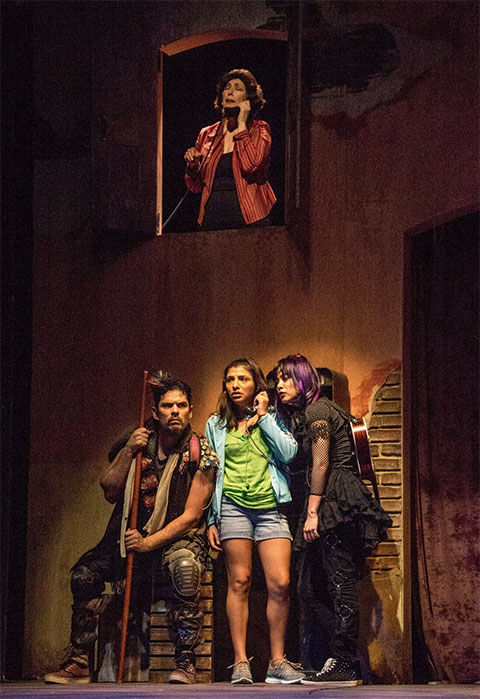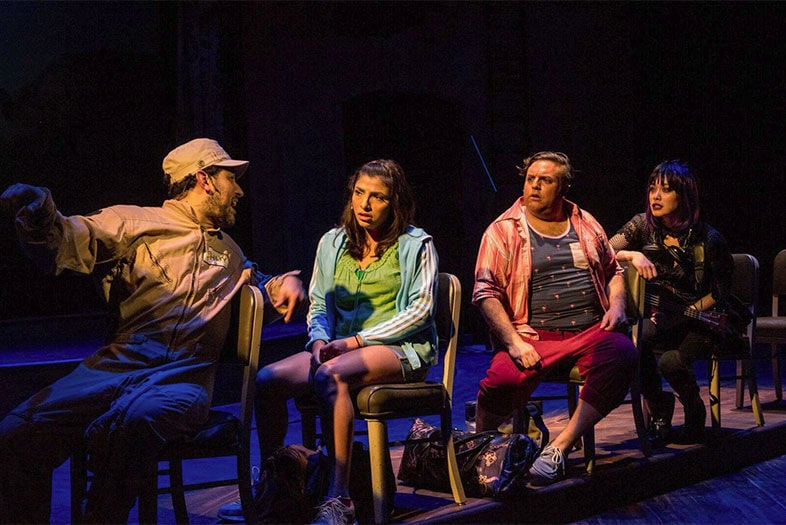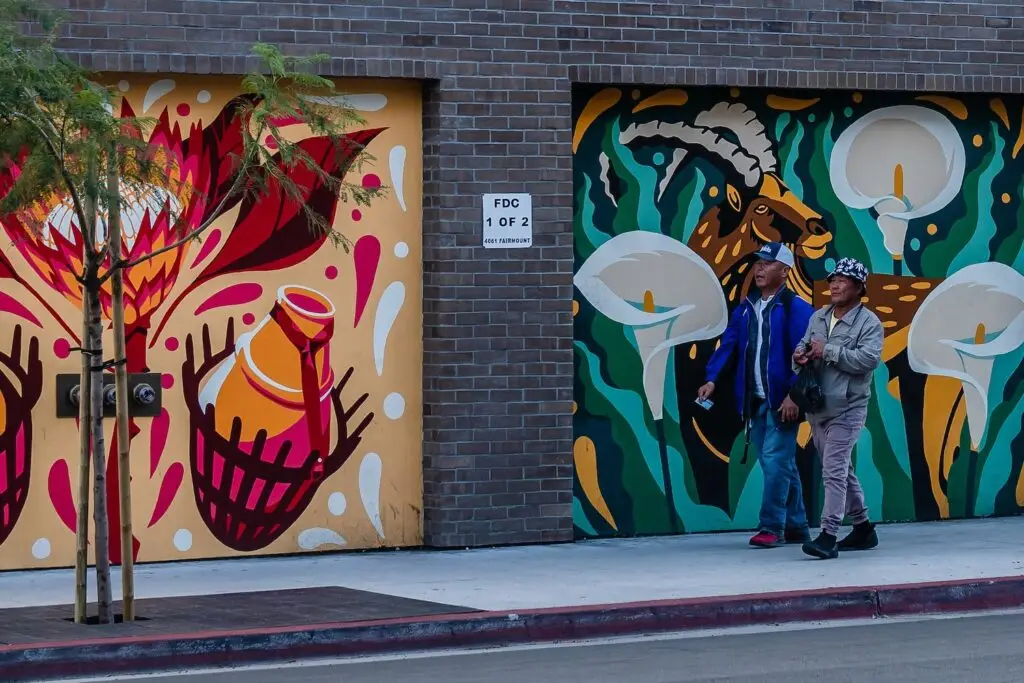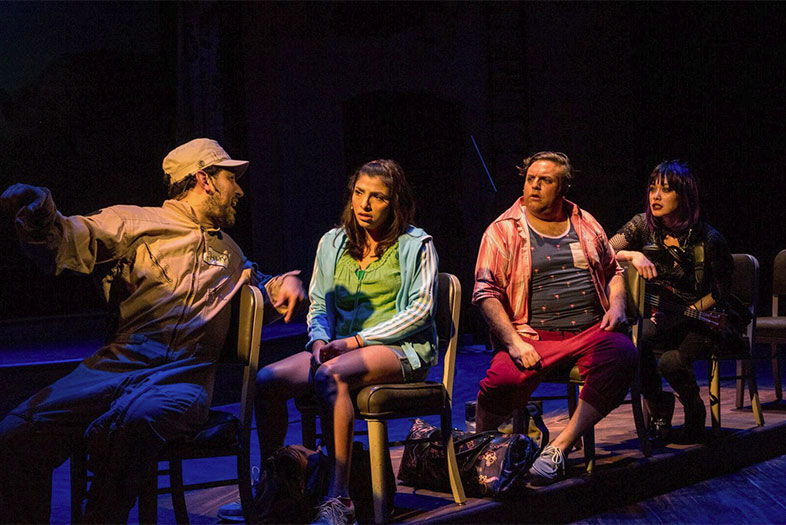Into the Beautiful North, a Lyceum Stage world premiere adapted from a KPBS One Book, One San Diego–selected novel by Luís Alberto Urrea, is like a spiritual cousin of Miss You Like Hell, a musical that debuted at La Jolla Playhouse last year. Both explore Mexican American identity through parent-child reconciliation against the backdrop of an epic road trip, their characters imperiled at every turn by the dispassionate bureaucrats and petty tyrants of immigration enforcement. Where Hell keeps its mother and daughter together in the US to tell a more specific, interpersonal story, North crosses the border in search of an absent father to paint a more composite picture of the immigrant experience.
Life in Tres Camarones isn’t bad for young Nayeli (Kenia Ramirez), but when a pair of visiting narcos menace her gay friend Tacho (Bryant Hernandez), she realizes their sleepy Sinaloan fishing village has been left defenseless now that nearly all its men—including her father—have left for the US in search of work. Her best friend Vampi (Jennifer Paredes) has even been orphaned, adopting a goth persona to cope. A screening of The Magnificent Seven convinces Nayeli that to defend her town from dangers without, she must go north, Tacho and Vampi in tow, on a quest to bring siete magníficos back home.
Our three leads’ colorful, vivacious personalities clash early and often with the many dangers such a journey might entail, improbably encountering them one after another over the course of several border-crossing attempts like the world’s worst guided tour. From predatory federales and paranoid border patrol agents to con men and immigrant-hating rednecks, these woods are haunted by every monster you could think of.
Injustices rendered abstract and numbing from news headlines gain renewed terror in the context of characters we’ve invested in.
Dramatizing so many dimensions of a politically fraught issue works to admirable effect: Injustices rendered abstract and numbing from news headlines gain renewed terror in the context of characters we’ve invested in. The resulting plot is so jampacked, however, that it often feels breathless. This may stem from the adaptation: playwright Karen Zacarías seems to have retained a critical mass of set pieces and subplots from the novel, but I can’t help wondering if cutting just a little more could’ve maximized the impact of what remains. (He said, fighting to keep his own review under word count.)

Cross-Border Adventures Await at the Lyceum’s ‘Into the Beautiful North’
Calling Tia Irma (Catalina Maynard) back home for encouragement, with heroic sidekick Atomiko (Jorge Rodriguez) for backup. | Photo: Daren Scott
Another adaptation tic is overreliance on exposition, which at its worst spoils a climactic, devastating realization that much of the play has been building toward. Nayeli narrates her own emotional impact rather than expressing it, and we’re off to the next scene. The plot ends up finding an alternate resolution that’s uplifting and satisfying in itself, but it’s a shame it takes such an abrupt switch to get there.
For the most part, though, tight direction from Sam Woodhouse and sharp control from our three principals save us from whiplash. Especially Ramirez, who inhabits every moment so deeply that she can convey the terror of being lost without a place to sleep, or the sublime wonder of feeling snow for the first time, in just a few short beats. Likewise, Hernandez’s emotional arc spans abject humiliation to unbridled joy without ever feeling forced, and Paredes leads occasional ukulele interludes that give everyone much-needed time to recenter.
The ensemble cast is stellar. Catalina Maynard plays such an assured and commanding mayor, one wonders whether Tres Camarones needs those men after all; Xavi Moreno is by turns a comically boisterous bus driver and a sweet, understated farm worker; Javier Guerrero makes for a menacing coyote and a dopey but charming gringo. Herbert Siguenza deserves special accolades for individualizing a sadistic federal agent, a folksy border officer, and a flamboyant clubgoer (among several others) that could easily have been cliches. Most entertaining is “Atomiko” (Jorge Rodriguez), who fancies himself a superhero, complete with catch phrase and sound effects. His Don Quixote fantasy may be a little flat, but his antics are so helpful and his personality so endearing, holding that against him would miss the point.
Winsome performances from every actor in the production keep the audience engaged through spots of minor incredulity. For me, everything clicked into place during a specific moment early on, when Vampi recoiles in exaggerated, performative pain from a Virgin Mary statue. Yeah, I thought, I knew that kid. To whatever extent this validation matters coming from a white guy who grew up in Latino-majority Chula Vista, every character felt true to life, and when it comes to telling a good story, there’s almost no higher praise to give.
San Diego Repertory Theatre
March 30–April 23, 2017

Cross-Border Adventures Await at the Lyceum’s ‘Into the Beautiful North’
PARTNER CONTENT
Xavi Moreno, Kenia Ramirez, Bryant Hernandez, and Jennifer Paredes. | Photo: Daren Scott


















